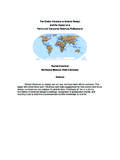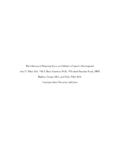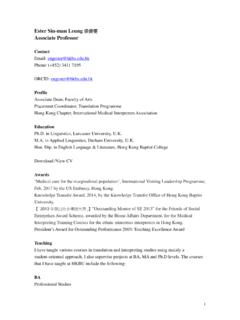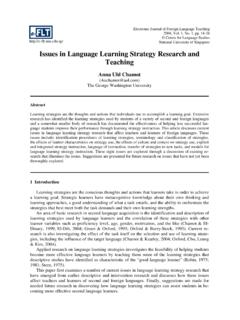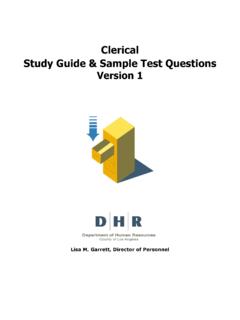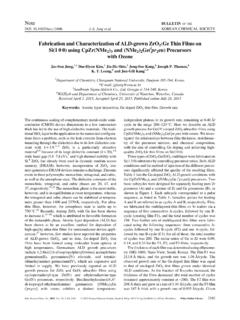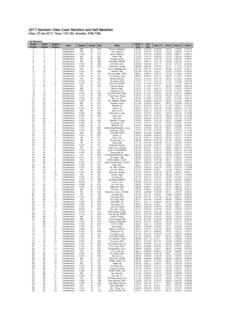Transcription of The Influence of Parenting Styles on Children’s Cognitive ...
1 The Influence of Parenting Styles on Children s Cognitive Development Amy E. Tiller, , *M. E. Betsy Garrison, , *Elizabeth Benchea Block, MPH, Kathryn Cramer, , and Vicky Tiller, Louisiana State University AgCenter Abstract Based on a larger longitudinal project of family stress and children s development, the primary objective of the current study was to investigate the relationships between Parenting Styles and children s Cognitive ability in families with young elementary school-aged children. Parents completed a self-administered survey on family experiences, including Parenting Styles . Children were interviewed at their schools where the Brief Intellectual Ability portion of the Woodcock-Johnson III was administered. The findings of the current study indicate that Parenting Styles are not better predictors of children s Cognitive ability than family socioeconomic-demographic characteristics.
2 The Influence of Parenting Styles on Children s Cognitive Development A great deal of literature published before the 1990s examined the effects of Parenting Styles on children s outcomes, particularly establishing the benefits to children of authoritative Parenting as opposed to the negative outcomes produced by authoritarian and permissive Parenting (Demo & Cox, 2000). The age group included in the present study has been understudied, however. Most of the existing studies that examine the relationship between Parenting Styles and children s Cognitive development are comprised of families with adolescents ( Aunola, Stattin & Nurmi, 2000; Dornbusch, Ritter, Leiderman & Roberts, 1987; Leung & Kwan, 1998; Leung, Lau, & Lam, 1998) or college students (Hickman, Bartholomae & McKenry, 2000; Kawamura, Frost, & Harmatz, 2002). There is a need, then, to study families with younger children so that parents better understand their children s development in light of their own Parenting practices and fully realize the implications of these practices on their children s current and future academic success.
3 Belsky s (1984) model of the determinants of Parenting is based on studies of child maltreatment. It examines the factors that Influence Parenting and, consequently, child outcomes, and it seeks to answer the question, Why do parents parent the way they do? Belsky states that the determinants of Parenting shape childrearing, which in turn Influence child development (p. 84). The model has three domains: (a) the personal psychological resources of the parents; (b) the characteristics of the child; and (c) contextual sources of stress and support that include the marital relations, the social networks, and the occupational experiences of parents. Belsky, Robins, and Gamble (1984) define competent Parenting as the style of child rearing that enables the developing person to acquire the capacities required for dealing effectively with the ecological niches that she or he will inhabit during childhood, adolescence, and adulthood (p.)
4 251). Competent Parenting is related to warmer, more accepting, and more helpful Styles of Parenting (Bogenschneider, Small, & Tsay, 1997). Authoritative Parenting is competence-inducing in that it recognizes the child s need for control and individuality, views the rights and duties of parents and children as complementary, and is characterized by sensitivity to children s capabilities and the developmental tasks they face (Belsky, Lerner, & Spanier, 1984). Belsky s (1984) model provides the framework for the current study in which a direct link between Parenting and child outcomes is posited and empirically tested with a sample of younger children and both their mothers and fathers. Review of Literature Many studies exist that examine Parenting Styles ( , Abell, Clawson, Washington, Bost, & Vaughn, 1996; Beyer, 1995; Bluestone & Tamis-LeMonda, 1999). Baumrind s (1978) three Parenting Styles of authoritarian, permissive, and authoritative are often used in studies investigating Parenting Styles in relation to diverse child outcome variables, such as academic achievement, self-confidence, aggression, delinquent behavior, and substance abuse (Dornbusch et al.
5 , 1987; Hart, Nelson, Robinson, Olsen, & McNeilly-Choque, 1998; Hill, 1995; Lamborn, Mounts, Steinberg, & Dornbusch, 1991; Shumow, Vandell, & Posner, 1998). Researchers typically have identified these three Parenting Styles based on the levels of control and warmth displayed by parents on a regular basis and in a variety of situations. Past research has also included a fourth Parenting style called neglectful, which is characterized by low warmth and low control (Dekovic & Gerris, 1992; Glasgow, Dornbusch, Troyer, Steinberg, & Ritter, 1997; Lamborn et al., 1991; Leung & Kwan, 1998). Maccoby and Martin (1983) call this Parenting style Indifferent-Uninvolved. They describe these parents as emotionally detached. Indifferent-uninvolved, or neglectful, parents tend to keep their children at a distance, responding to child demands only to make them cease. Little is known about this Parenting style, and research on this population of parents is lacking because they are typically not very responsive or involved in their children s lives and, therefore, do not volunteer to be studied.
6 Because these parents, and consequently their children, are difficult to study, the current study examined only the three previously mentioned Parenting Styles . Studies that examined how Parenting Styles influenced the Cognitive development of young elementary-aged children are rare ( , Chen, Dong, & Zhou, 1997), and no studies were found that used a standardized assessment of Cognitive ability, like the Woodcock Johnson. In a study of adolescents, Dornbusch et al. (1987) found that authoritarian and permissive Parenting Styles were negatively associated with higher grades, whereas the authoritative Parenting style was positively associated with higher grades. Radziszewska, Richardson, Dent, and Flay (1996) found similar results in their study of 15-year-olds. In another study of adolescents, Leung, Lau, and Lam (1998) found that that academic achievement was negatively related to authoritarianism.
7 In a study of adolescent minority students (Hispanic American, African American, and Asian American), Boveja (1998) found that adolescents who perceived their parents to be authoritative engaged in more effective learning and studying strategies. Based on Belsky s (1984) model and the reviewed literature, the primary objective of the current study was to investigate the Influence of authoritative, authoritarian, and permissive Parenting Styles on children s Cognitive ability. We expected that higher levels of authoritative and lower levels of authoritarian and permissive Parenting practices were related to higher levels of Cognitive ability. A secondary objective was to compare Parenting Styles and socioeconomic-demographic variables as predictors of young elementary school-aged children s Cognitive ability Procedures Participants and Sampling Following Institutional Review Board approval, permission was secured from 19 schools to recruit first and third grade children and their families from a medium-sized southern city in the From these 19 schools, parental permission was received from 431 families.
8 A parental survey that assessed internal family processes, including Parenting Styles and socioeconomic-demographic characteristics, was mailed to each participating family in 2001. Families were offered a compensation of $ for participating in the study. Parental surveys were returned from 290 families (278 mothers and 143 dads) for a 67% response rate. The children were interviewed at their schools during the spring. From the 290 families, 133 first graders and their families and 148 third graders and their families were interviewed. Nine of the 290 children were not able to be interviewed because they either moved out of the area, transferred to a school that was not participating in the study, or did not meet the sampling criteria ( , they were too old or had a disability). In addition, a few of the mothers and fathers did not complete the entire Parenting Styles assessment so they were removed from the analyses of the current study, yielding a final sample size of 267 mother-child pairs and 127 father-child pairs.
9 The majority of the mothers or female legal guardians (in all cases either a grandmother or aunt) were African American (51%) or White (43%); 11 mothers were Native American, Hispanic/Spanish/Latino, or Asian or Pacific Islander. The ages of the mothers ranged from 20 to 61 years of age, and the majority of the mothers (66%) were married or cohabiting. About 43% of the mothers had attended some college or trade school, and most of the mothers (67%) were employed and worked full-time (at least 40 hours per week). Slightly over 27% of the mothers reported a household income of between $20,000 and $40,000. Compared to the residents of the catchment area, the mothers of the current study are typical. As far as the fathers or male legal guardian, the majority were White (62%), although 32% were African American; less than a handful of fathers were Native American, Hispanic/ Spanish/Latino, or Asian or Pacific Islander.
10 The ages of the fathers ranged from 21 to 68 years old, and the majority of the fathers (88%) were married. About 39% of the fathers had attended some college or trade school, and most were employed (96%) and worked full-time (at least 40 hours per week). Slightly over 30% of the fathers reported a household income of between $20,000 and $40,000, and another 29% reported a household income of between $40,000 and $60,000. Compared to the residents of the catchment area, the fathers of the current study are not typical with respect to race and income. Variables and Assessments Parenting Styles Scores from the Primary Caregivers Practices Report (PCPR Robinson, Mandleco, Olsen, & Hart, 1995) assess the level of a parent s or guardian s Parenting style with respect to Baumrind s primary Parenting Styles typologies: authoritarian (high control, low warmth), permissive (low control, high warmth), and authoritative (high control, high warmth).
